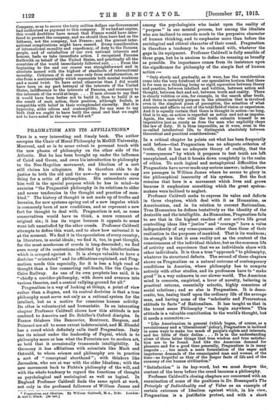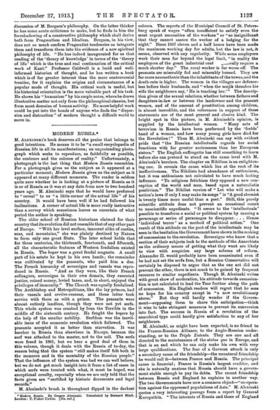PRAGMATISM AND ITS AFFILIATIONS.*
THIS is a very interesting and timely book. The author occupies the Chair of Moral Philosophy in McGill University, Montreal, and so is to some extent in personal touch with the new phases of philosophy on the other side of the Atlantic. But he has been brought up under the influence of Caird and Green, and owes his introduction to philosophy to the Neo-Hegelian movement, and Idealism of a sort still claims his allegiance. He is therefore able to do justice to both the old and the new—by no means an easy thing for a critic of philosophies. His antecedents serve him well in the special purpose which he has in mind—to examine "the Pragmatist philosophy in its relations to older and newer tendencies in the thought and practice of man- kind." The history of thought is not made up of truths and heresies, for new systems spring out of a new impulse which is commonly born of new conditions, and so represent a new fact for thought to deal with. Pragmatism is not, as some conservatives would have us think, a mere remnant of original sin ; it has its vogue because it appeals to some want left unsatisfied by the other creeds. Professor Caldwell attempts to define this want, and to show how universal it is at the moment. We find it in the speculation of every country, in literature, in social ideals ; we find it, too, in past thought, for the most mushroom of creeds is long-descended ; we find even many of its contentions admitted by the intellectualism which is arrayed against it. It is always valuable to have a doctrine " orientated " and its affiliations explained, and Prag- matism needs this especially, for it is less a high road of thought than a line connecting rail-heads, like the Cape-to- Cairo Railway. As one of its own prophets has said, it is "chiefly a corridor-philosophy, with doors and avenues into various theories, and a central rallying-ground for all."
Pragmatism is a way of looking at things, a point of view rather than a dogma, and its central doctrine is that a true philosophy must serve not only as a rational system for the intellect, but as a motive for conscious human activity. Its ethos is voluntaryist and humanistic. In an interesting chapter Professor Caldwell shows how this attitude is not confined to America and Dr. Schiller's Oxford disciples. In France thinkers like Renouvier, Boutroux, Bergson, and Poincare are all to some extent indeterminist, and M. Blondel has a creed which definitely calls itself Pragmatism. Italy has its school under the leadership of Papini, which is to philosophy more or less what the Futurists are to modern art, so bold that it occasionally transcends intelligibility. In Germany it has affiliations with scientists like Mach and Ostwald, to whom science and philosophy are in practice a sort of "conceptual shorthand " ; with thinkers like Jerusalem, who are at war with the older Idealism; with the new movement back to Fichte's philosophy of the will, and with the whole tendency to regard the functions of thought as psychological and sociological as well as logical. In England Professor Caldwell finds the same spirit at work, not only in the professed followers of William James and
• Pragmatism and idealism. By William Caldwell, ICA., D.Sc. London: A. and C. Black. Um. net.]
among the psychologists who insist upon the reality of " purpose " in our mental process, but among the idealists who are inclined to concede much to the purposive character of human thinking, and to emphasize more than before the sociological and ethical character of their creed. Pragmatism is therefore a tendency to be reckoned with, whatever the gaps in its equipment. Professor Caldwell is fully sensible of these gaps, but he is anxious to define its meaning as broadly as possible. Its importance comes from its insistence upon the significance for philosophy of the simple fact of human action :—
" Only slowly and gradually, as it were, has the consideration come into the very forefront of our speculative horizon that there is for man as a thinking being no rigid separation between theory and practice, between intellect and volition, between action and thought, between fact and act, between truth and reality. There is clearly volition or aim, for example, in the search after truth. And there is certainly purpose in the attention that is involved even in the simplest piece of perception, the selection of what interests and affects us out of the total field of vision or experience. And it is equally certain that there is thought in action—so long, that is to say, as action is regarded as action and not as impulse. Again, the man who wills the truth submits himself to an imperative just as surely as does the man who explicitly obeys the law of duty. It is thus impossible, as it were, even in the so-called intellectual life, to distinguish absolutely between theoretical and practical considerations."
In a critical chapter he points out what has been frequently said before—that Pragmatism has no adequate criterion of truth, that it has no adequate theory of reality, that the " consequences " by which it proposes to test truth are left unexplained, and that it, breaks down completely in the realm of ethics. To such logical and metaphysical difficulties the Pragmatists have never made any serious answer; indeed, there are passages in William James where he seems to glory in the philosophical insecurity of his system. But the fact remains that here is a movement which lives and grows because it emphasizes something which the great system. makers were inclined to neglect.
Professor Caldwell seeks to express its value and defects in three chapters, which deal with it as Humanism, as Americanism, and in its relation to current Rationalism. True Humanism he defines tentatively as the identity of the desirable and the intelligible. As Humanism, Pragmatism fails to see that in the highest reaches of our active life great controlling ideas like "justice" and "courage" have a value independently of any consequences other than those of their realization in the purposes of mankind. That is its weakness ; its strength is that it sees reality not as the content of the consciousness of the individual thinker, but as the common life of activity and experience that we as individuals share with other individuals. It is thus a true " approach "to philosophy, whatever its structural defects. The second of these chapters shows us Pragmatism as a natural outcome of contemporary conditions in America, where philosophy has to compete actively with other studies, and its professors have to "make good" in a way unknown in our slower world. The American mind is concrete, empirical, a lover of novelty, believing in practical returns, essentially eclectic, highly conscious of social relations ; and so also is Pragmatism. It is demo- cratic, too, basing itself upon the ordinary life of the average man, and having none of the "scholastic and Procrustean attitude to facts" of Rationalism. It has taught us that in the truest sense Philosophy "can begin anywhere." This attitude is a valuable contribution to the world's thought, but it needs a corrective :—
" Like Americanism in general (which began, of course, as a revolutionary and a 'liberationist' policy), Pragmatism is inclined in some ways to make too much of people's rights and interests, and too little of their duties. . . . It is in the understanding alone of these latter things that true wisdom and true satisfac- tion are to be found. And like the American demand for pleasure and for a good time generally, Pragmatism is in many respects. . . too much a mere formulation of the eager and impetuous demands of the emancipated man and woman of the time—as forgetful as they of the deeper facts of life and of the economy of our human civilization."
" Satisfaction " is its key-word, but we must deepen the, content of the term before the creed becomes a philosophy. Professor Caldwell's closing chapters are concerned with an
examination of some of the positions in Dr. Bosanquet's The Principle of Individuality and of Value as an example of certain extremes of Idealism against which, in his view,
Pragmatism is a justifiable protest, and with a short
discussion of M. Bergson's philosophy. On the latter thinker he has some acute criticisms to make, but he finds in him the foreshadowing of a constructive philosophy which shall derive both from Pragmatism and Idealism. Bergson, in his view, does not so much confirm Pragmatist tendencies as integrate them and transform them into the evidence of a new spiritual philosophy of life. "He has indeed inaugurated for us that reading of the theory of knowledge' in terms of the theory of life' which is the true and real continuation of the critical work of Kant." Professor Caldwell is a lucid and well- informed historian of thought, and he has written a book which is of far greater interest than the mere controversial treatise, for it explains the origins and circumstances of a popular mode of thought. His critical work is useful, but his historical orientation is the more valuable part of his task. He shows his "humanism" by his ample notes, where he draws illustrative matter not only from the philosophical classics, but from most domains of human activity. No more helpful work could be put into the hands of anyone who finds the "disper- sion and distraction" of modern thought a difficult world to move in.



































 Previous page
Previous page